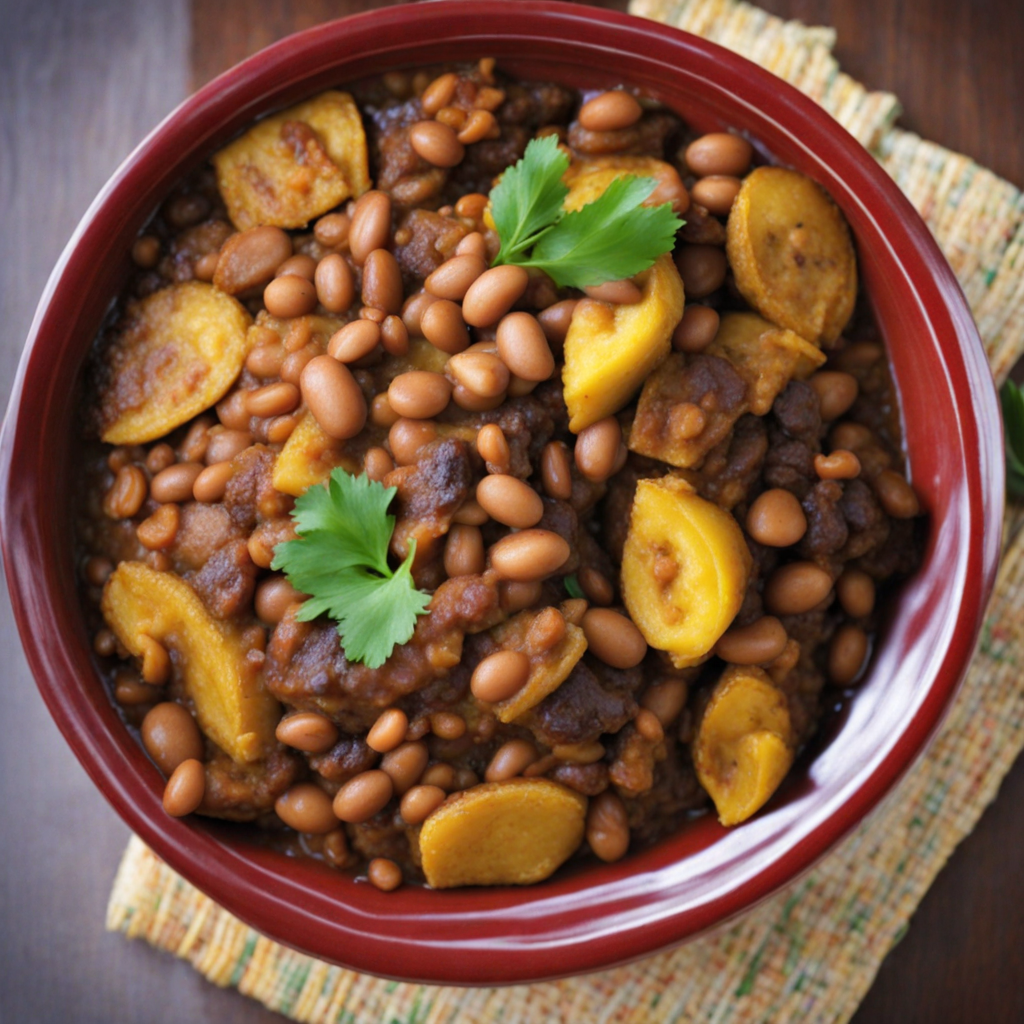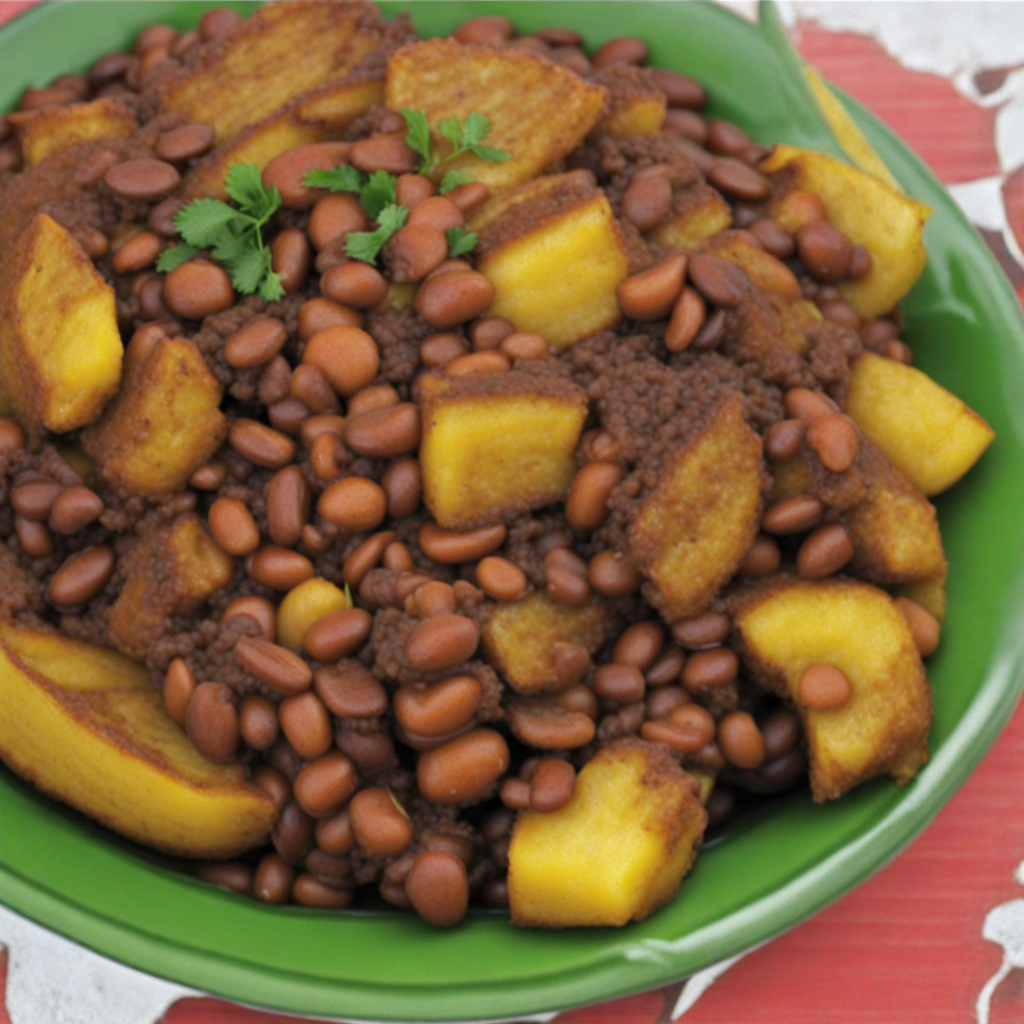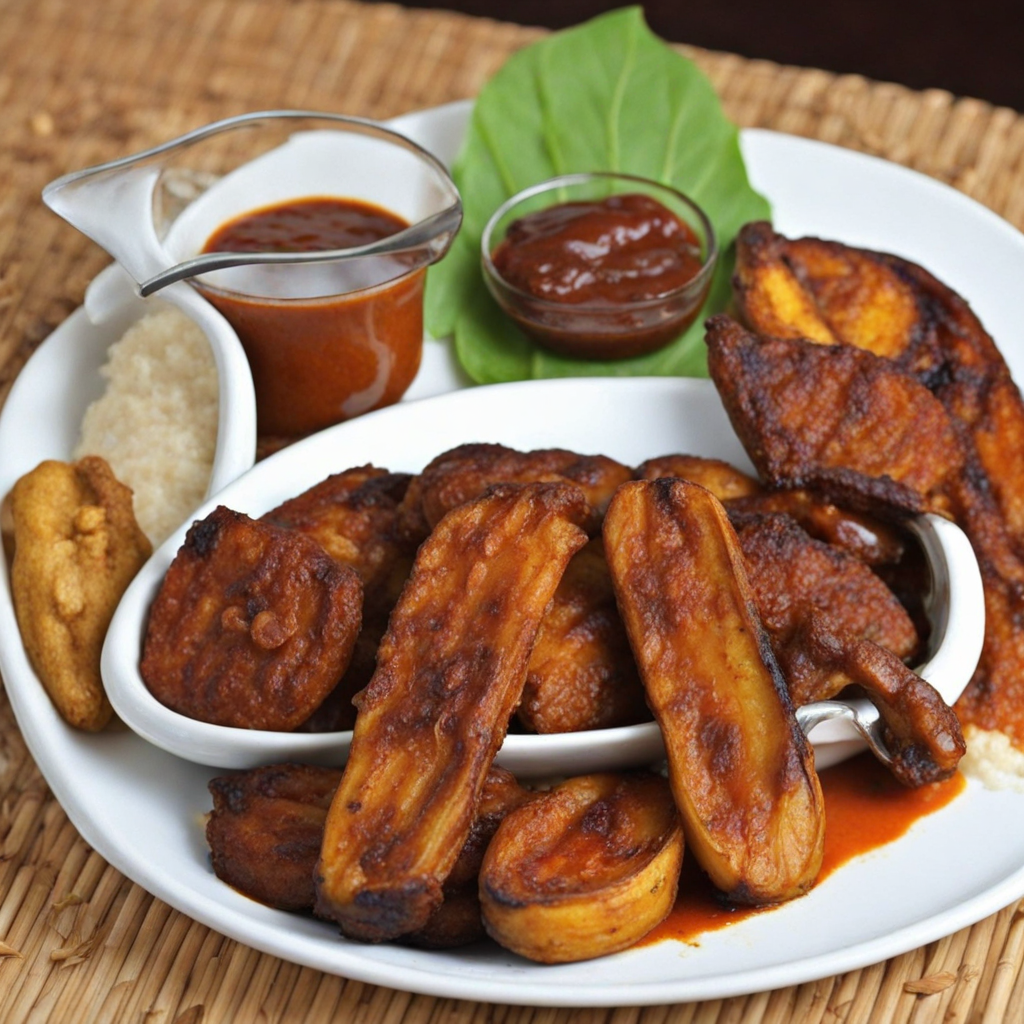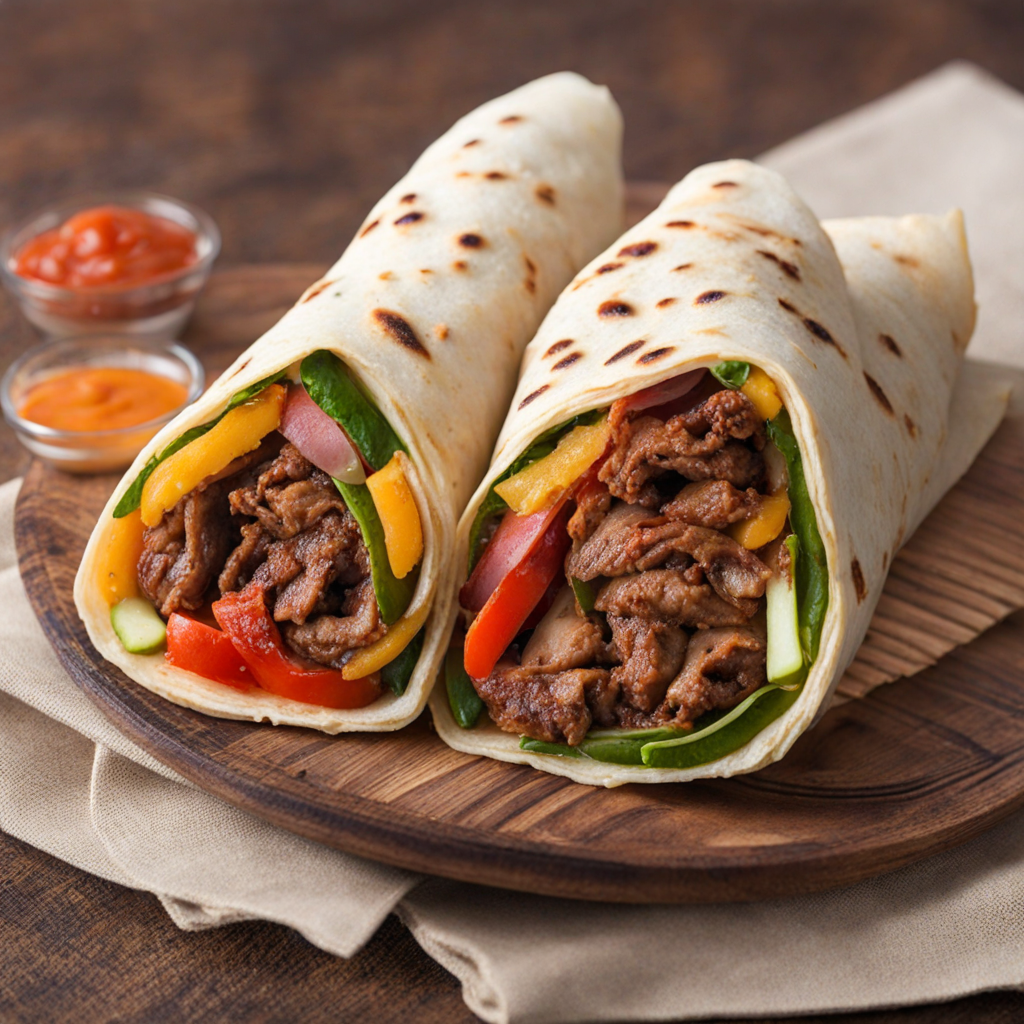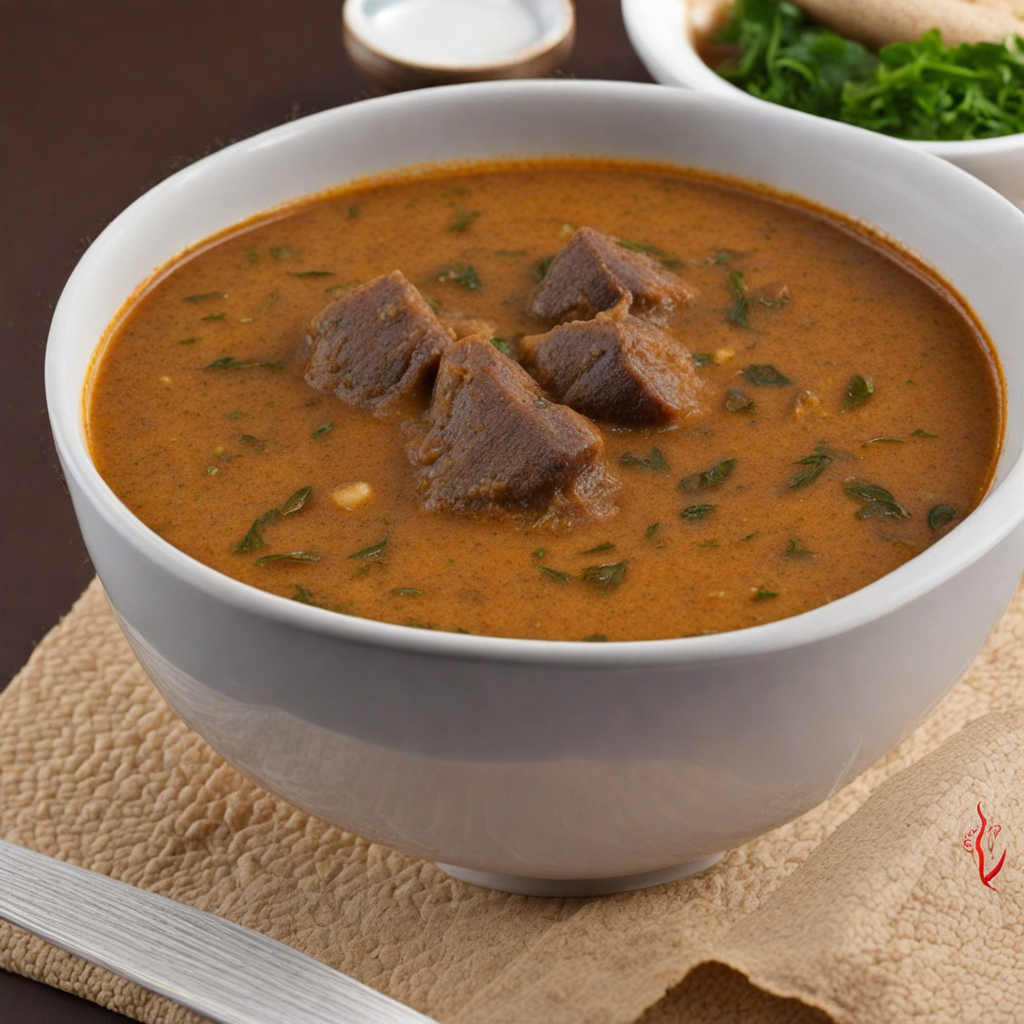Beans and Plantain
Beans and Plantain is a delightful and nutritious dish that embodies the essence of Nigerian cuisine. This dish typically features black-eyed peas or brown beans, which are cooked until tender and then seasoned with a medley of spices. The beans are often sautéed with onions, pepper, and sometimes tomatoes, creating a rich and flavorful base. The combination of the creamy beans and the spices results in a hearty and satisfying dish that offers a unique taste experience, highlighting the earthy flavors of the legumes. Complementing the beans are ripe plantains, which are either fried or boiled to achieve a sweet and slightly caramelized flavor. The natural sweetness of the plantains balances the savory elements of the beans, creating a harmonious blend of tastes and textures. The golden-brown plantains add a delightful contrast, with their soft interior and crispy exterior, making each bite a celebration of flavor. Together, the beans and plantains create a filling meal that is both comforting and energizing. In addition to being delicious, Beans and Plantain is also a healthy choice, packed with protein, fiber, and essential nutrients. This dish is often enjoyed as a main course or a side, and it can be accompanied by a variety of sauces or stews, such as pepper sauce or vegetable stew, to enhance its flavor even further. For those looking to explore the vibrant and diverse world of Nigerian food, Beans and Plantain is a must-try dish that offers a taste of the country's rich culinary heritage.
How It Became This Dish
The Rich Heritage of Beans and Plantain in Nigerian Cuisine Beans and plantain, two staples of Nigerian cuisine, embody a rich history and cultural significance that resonates throughout the country. This dish, often enjoyed in various forms, encapsulates the agricultural abundance of Nigeria and reflects the country's diverse culinary traditions. #### Origins of Beans and Plantain Beans, particularly varieties such as black-eyed peas and cowpeas, have been cultivated in West Africa for thousands of years. Archaeological evidence suggests that the domestication of these legumes can be traced back to around 5000 BC. Beans played a crucial role in the diet of early West African societies, providing a rich source of protein, fiber, and essential nutrients. Plantains, on the other hand, are believed to have originated in Southeast Asia and were introduced to Africa through early trade routes. By the time plantains reached West Africa, they had become an integral part of local diets. They thrive in the tropical climate, making them an ideal crop for Nigerian farmers. The cultivation of plantains has been documented in Nigeria for centuries, with various regions developing their own unique varieties and cooking methods. #### Cultural Significance Beans and plantain are not just food items; they hold deep cultural significance within Nigerian society. In many ethnic groups, particularly among the Yoruba, Igbo, and Hausa, these ingredients are staples that feature prominently in traditional meals. The combination of beans and plantain also symbolizes community and togetherness. It is often prepared for family gatherings, celebrations, and communal feasts. In Yoruba culture, beans are associated with the deity Sango, the god of thunder and fire, symbolizing strength and sustenance. Plantains, versatile and abundant, represent fertility and prosperity. When combined, beans and plantain create a balanced meal that reflects the harmony of life and the importance of agricultural bounty in Nigerian traditions. In many households, beans are often prepared as "Ewa," a popular dish made by boiling the legumes and serving them with a spicy sauce. Plantains, when fried or grilled alongside, provide a sweet contrast to the savory beans. This dish is not just a meal but an experience, often enjoyed with family and friends, fostering a sense of belonging and cultural identity. #### Development Over Time As Nigeria evolved through the centuries, so did its agricultural practices and culinary techniques. The introduction of new cooking methods and spices transformed how beans and plantain were prepared. In the early 20th century, with the rise of urbanization and globalization, traditional meals began to incorporate influences from other regions and cultures. In urban centers like Lagos and Abuja, street food vendors popularized a quick version of the classic dish, often serving beans and plantain in portable containers, making it accessible for people on the go. This adaptation maintained the essence of the traditional meal while catering to the fast-paced lifestyle of modern Nigerians. The fusion of flavors also became more pronounced as Nigerian chefs began to experiment with international cuisines. Techniques from Indian, Chinese, and even Western cooking were incorporated, leading to innovative dishes that fused traditional beans and plantain with spices, sauces, and cooking styles from around the world. For instance, the use of coconut milk, which is prevalent in some coastal regions, has created variations that add a tropical twist to the traditional beans and plantain combination. #### Regional Variations Nigeria is a country with over 250 ethnic groups, each possessing unique culinary practices. Consequently, beans and plantain have regional variations that reflect local ingredients and tastes. In the southwestern regions, particularly among the Yoruba, beans are typically prepared with a spicy tomato sauce called "Ewa Riro," while plantains are often fried to a golden crisp. In the northern regions, the Hausa prepare a dish known as "Dambun Gero," where beans are blended with spices and served with boiled plantains. In the southeastern part of Nigeria, the Igbo people have their own distinct methods of preparing beans, often incorporating local spices and flavors. Here, beans may be served alongside "Nkwobi," a cow foot dish, and fried plantains, creating a rich and flavorful meal that showcases the region's culinary diversity. #### Health Benefits and Sustainability In contemporary discussions surrounding food security and nutrition, beans and plantain have gained recognition for their health benefits. Beans are a fantastic source of plant-based protein, making them an essential component of a balanced diet, particularly in a country where meat can be expensive. Plantains, rich in vitamins A and C, are a great source of dietary fiber and potassium. Sustainability is another important aspect of beans and plantain cultivation. Both crops are well-suited to Nigeria's climate and can be grown in various soil types, making them resilient to changing environmental conditions. As more Nigerian farmers adopt sustainable agricultural practices, the cultivation of beans and plantains offers an avenue for improving food security and supporting local economies. #### Modern Influence and Global Recognition In recent years, Nigerian cuisine has garnered international attention, with beans and plantain often highlighted as key components of the nation's culinary identity. Chefs and food enthusiasts around the world have begun to explore traditional Nigerian dishes, leading to an increased appreciation for the cultural richness embedded in these foods. Food festivals, cooking classes, and social media platforms have helped to promote beans and plantain beyond Nigeria’s borders. This globalization of Nigerian cuisine has not only sparked interest among international food lovers but has also encouraged a resurgence of pride in traditional cooking among Nigerians, particularly the younger generation. #### Conclusion The story of beans and plantain in Nigeria is one of resilience, cultural identity, and culinary evolution. From their ancient origins to their modern-day significance, these ingredients have transcended time and geography, uniting people through the shared experience of food. As Nigeria continues to navigate globalization and urbanization, the enduring legacy of beans and plantain remains a testament to the country’s agricultural heritage and rich cultural tapestry. Through every meal, the flavors of beans and plantain tell a story—a story of community, tradition, and the vibrant spirit of Nigeria.
You may like
Discover local flavors from Nigeria


